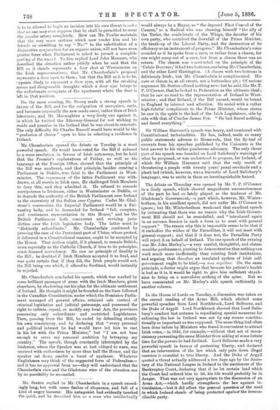Mr. Chamberlain opened the debate on Tuesday in a most
powerful speech. He would have voted for the Bill if reduced to a mere resolution in favour of Irish autonomy, but he held that the Premier's explanations of Friday, as well as his language at the Foreign Office, showed that the principle of the Bill was unaltered, and that principle, besides creating a Parliament in Dublin, was fatal to the Parliament in West- minster. The supremacy of the latter Parliament was with- drawn, at all events in Irish eyes. He challenged Irish Members to deny this, and they admitted it. He refused to concede omnipotence to Irishmen, either in Westminster or Dublin, or to degrade the authority of the British Parliament over Ireland to the suzerainty of the Sultan over Cyprus. Under Mr. Glad- stone's concessions, the Imperial Parliament would be a fluc- tuating body, and he demanded for Ireland "fall, complete, and continuous representation in this House," and for the British Parliament both concurrent and revising juris- diction over the Irish legislative body. The latter must be "distinctly subordinate." Mr. Chamberlain continued by pressing the case of the Protestant part of Ulster, whose protest, if delivered in a Constitutional manner, ought to be accepted by the House. That section ought, if it pleased, to remain British, more especially as the Catholic Church, if true to its principles, mast demand ascendency. He saw no principle of finality in the Bill ; he doubted if Irish Members accepted it as final, and was quite certain that if they did, the Irish people would not, the Bill being one which, if offered to Scotland, would instantly be rejected.


































 Previous page
Previous page